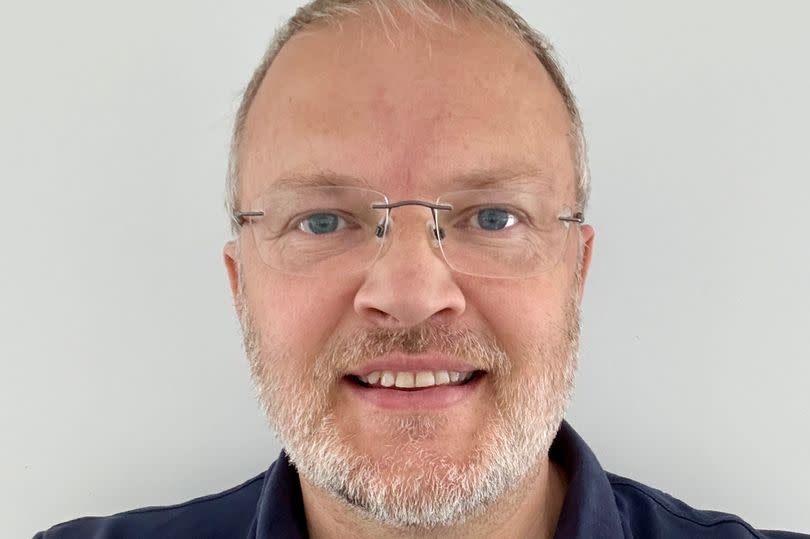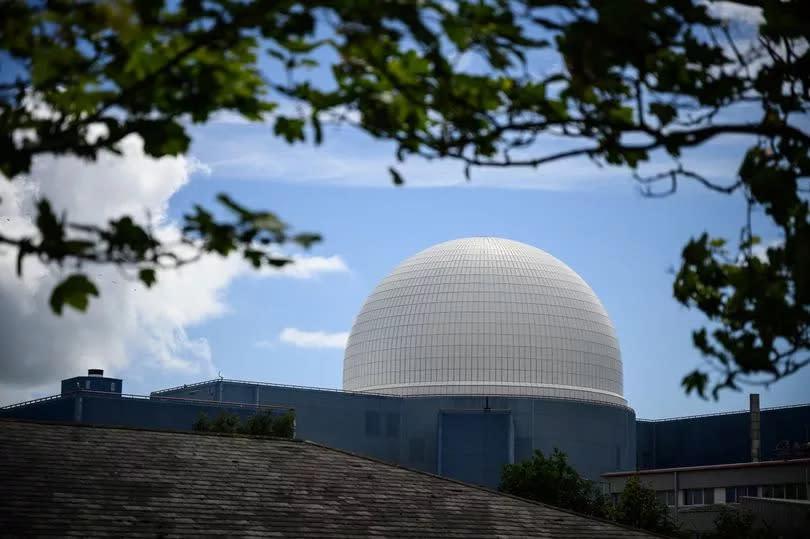General Election 2024: SDP candidate Christopher Stephenson makes his case to Grimsby and Cleethorpes voters

Town centre regeneration and support for the family are among SDP candidate Christopher Stephenson's priorities if elected as the Great Grimsby and Cleethorpes MP.
In the run-up to polling day, Grimsby Live is speaking to Grimsby and Cleethorpes candidates, putting to them set questions, mostly prompted by reader feedback, to find out their priorities and stances. There are seven candidates standing in the constituency.
For the first time at a general election, Grimsby and Cleethorpes are together in one constituency with the exception of the Scartho ward, which is in Brigg and Immingham.
Read More:
Christopher Stephenson is the SDP candidate in Great Grimsby and Cleethorpes. He has lived in the area all his life and for just over 20 years, run a small business locally. He has also raised his family, and has kids in school and college.
What will be your priorities for Great Grimsby and Cleethorpes, if elected?
"One of the first priorities would be to support the continued regeneration of the town centre," he said, adding also to look at tailored support "for redevelopment of parts of Cleethorpes". He name-checked the North Promenade, and Pleasure Island site. "It’d be nice to see some regeneration of Cleethorpes as well."
"On a wider level, I think we need to look at generating a sense of pride really in the town. I think sometimes we’re a little bit negative ourselves about the area, so trying to reinvigorate a sense of pride. I think probably we do this by providing a clean, safe space for people to live in, tackle lower level crimes such as anti-social behaviour. And also improve the area we live in by tackling more serious crimes as well. Drug runs have been, I think, a bit of a problem in the area in recent times. We’d like to see that continue to be tackled."
Another priority was the education system. "There’s only so much you can do at a local level, but continue to fight for proper funding for education. I know other parties mention this, but we do have a shortage in specialist maths and science teachers, which I know from personal experience is a problem, so we’d like to put pressure on to make sure that is tackled.
"Look for investment in our transport networks, obviously with the cancellation of HS2, SDP policy is to look at funding improvements in northern rail networks. Our policy will be to take the railways back into public ownership, and improve funding in other forms of public transport." He mentioned buses and also investment in highways generally.
"So businesses feel able to invest in the area with the right transportation links. I think if we get that right, that’s also going to support local businesses so they can grow. Having jobs for the local population and hopefully, that’ll feed into getting some more pride into the community."
"We believe in family, community, nation," he summarised SDP policies as. "I think the family’s the bedrock of any civilised, successful society. I think that’s where we’d start."
Reader-prompted question: What is your stance on immigration?
"We believe that selective immigration can make important contributions to our wider society. We believe that in recent years successive governments have become addicted, if you like, to mass immigration, indifferent to integrations, and the problems a lack of integration brings." He said the UK had been too tolerant, laidback and passive towards dealing with illegal migration.
Excessive immigration "results in lower wages" and disincentives businesses to invest in training, "which is detrimental, we believe to our young people, primarily". SDP immigration policy was focused on skills-based, needs-based, legal and subject to democratic control.
To facilitate that, the SDP want to withdraw from the 1851 refugee convention, ECHR "and any other international instruments which would deny our border sovereignty". They would also cap net migration at 50,000 a year for a generation.
"Anybody that came over immediately would be declined, it would result in immediate repatriation and detention offshore within a British Overseas Territory until repatriation was completed." It would allow for 20,000 refugee visas a year to "carefully vetted families" from conflict zones. "We’re not going to have an open door policy for anybody to jump on a boat and come across, that’s how we deal with it."
Reader-prompted question: Is criminalisation of wolf whistling a legal change you would like to see, and what are your crime issue priorities?
"I was quite dismissive of it," he said at the time of Labour’s Melanie Onn’s, when previously Grimsby MP, campaigning on misogyny to be treated as hate crime, including possibly wolf whistling. One element, upskirting, was later legislated against. "You talk to women, to family of your own, and I do recognise that some women are happy to receive a compliment.
"Some women might see a catcall as a compliment, that is true, I’ve had women tell me that. But for many women, far too frequently, I think it can feel rather more sinister and unsettling.
"Although it’s a bit of an outdated thing, I’m still not convinced that making it illegal would be a priority. I think it’s one of those things we should encourage people not to do. Whether we’d outlaw it is something I think would need a bit more careful consideration." He said he would encourage to be dealt with through society peer pressure, rather than the law.
"In terms of crime generally, obviously we see a lot of anti-social behaviour in Grimsby and Cleethorpes," he said, before mentioning knife crime seemingly increasing, and re-raising the issue of drug gangs. "These are concerns we’d want to tackle."
"We’d like to see our justice system be more robust on the lower level crimes, which we think would filter into higher standards in our communities, again that peer pressure," he said. "We’d also be pushing for greater funding for the police," he said. He added he would work, if elected, with the Police and Crime Commissioner to ensure "the right levels of police presence on our streets", which would hopefully help keep crime lower.
Reader-prompted question: What will candidates do to further create jobs and opportunities in the area for people within the region to support current industries and the growing offshore wind turbine/renewables sector?
"SDP policy is that we have a specific focus given to manufacturing. Part of our policy is to reindustrialise the UK." This would include modular nuclear reactors, investments in hydrogen, solar and wind farm manufacturing, and mineral fuel production.
"More specifically locally, we’d just look to work collaboratively, making sure we’ve got the right environment in this area. This feeds into previous comments about making sure that the transport networks are in place, the educational facilities are in place for young people to move into those areas. Just making sure for anybody who wants to invest, the infrastructure’s there for them to tap into."

Reader-prompted question: What will you push for on climate and the environment?
"With regards to water, we’d look to take water back into public ownership. We’d look at cleaning up our rivers and beaches by setting capital investment targets to prevent sewage discharges. We’d support farmers to reduce livestock entity in those sensitive catchments, and by robustly enforcing water pollution regulations.
"But this isn’t a quick fix. This is something people need to understand it’s something that takes time, it’s not going to happen overnight." On the climate, he said the party accepts the broad scientific consensus on fossil fuels and to reduce aggregate use of them.
"But we do not support the unrealistic objectives such as net zero, which we believe leads to an unbalanced and costly energy regime in the UK. We aren’t really materially impacting global warming on a global scale." The SDP would look to renationalise power supply and redistribution, under a new body called British Energy. He added "Labour nicked our name almost" with its GB Energy.
The SDP were committed to new power generation plants and increasing nuclear's contribution to the British energy mix from 12 to 40 per cent within ten years. "British Energy would develop a regulatory framework to support gas fracking, carbon capture and storage. Obviously, adequate environmental assessments would take place before that was carried out. And for so long as natural gas remains a necessary part of the mix, because it isn’t something we can just switch off.
"We would allow new permits for exploration and production of North Sea oil and gas. However, we would also incentivise expenditure on heat pumps, insulation, household solar panels, and double/triple glazing." Mr Stephenson added the SDP would "invest heavily" in the likes of battery technology research, hydrogen, nuclear, and tidal. Other low energy transport would get additional funding as well.
"That is how we see a realistic approach at tackling what is termed as the climate crisis."
Reader-prompted question: What are you prepared to do for struggling families and people on low income that cannot afford to feed their kids and pay bills?
Noting part of the original reader question part-reference free school meals, he said: "We support free school meals for primary school children during term time, that’s one of our manifesto commitments."
"We’re also committed to reinstating tax thresholds," he added, saying more people were being caught in tax because of tax threshold freezes.
Through the tax and benefits systems, the SDP would look at offering greater protection and support for families, he said. "As an example, a couple raising children together, a basic rate taxpayer and a non-taxpayer, you’d have full transference of the tax allowance." A family in that circumstance would earn £25,000+ without paying tax, he said.
Reader-prompted question: What are candidates' plans for the sheer number of HMOs in Grimsby and the loss of family homes?
"We need to pay attention to ensure there is an adequate number of family homes available," he said, noting the HMOs was a local, not national, issue.
"Again, there’s no quick tricks. Any housing issues also needs to tackle the demand for them, so again people coming into the country. Whether settling in Grimsby, Cleethorpes, or anywhere else, it’s supply and demand to a certain extent.
"But we’ve got a commitment to building social housing,” he said, adding the national pledge was 100,000 a year. "Again, we’ve got to be realistic about the social housing. There’s only so much capacity within the market to build so many houses. Locally, I believe there are many empty homes in the Grimsby and Cleethorpes area. Our focus should be to repurpose and bring these back into use.
He continued: "There’s lot of empty properties in the town centre, for example, that we believe can be brought back into use for families.
"Couple that with the commitment to building new social housing, and that should provide access to suitable and affordable housing for families in Grimsby and Cleethorpes."

 Yahoo News
Yahoo News 
